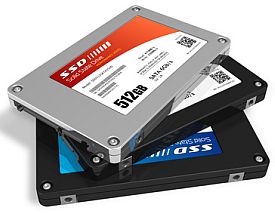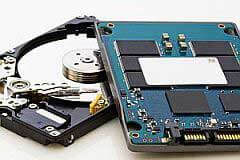Advantages of SSD hard drives
SSDs offer a couple of advantages over traditional HDDs:
- completely shock-resistant
- silent
- marginal heat development
- can boot a computer within seconds
- identical data throughput for sustained and random access
- very energy-efficient
- light and compact

SSD as backup mediums
Solid State Drives (SSDs) utilise several groups of flash memory instead of a rotating magnetic cylinder. Because SSD devices have no moving parts, they operate silently and don’t need any special cooling. SSD drives are very durable and shock-resistant in contrast to HDDs (normal hard disk drives), which are prone to mechanical defects when subjected to hard shocks. A real benefit of SSDs is the performance and silent operation.
SSDs vary in the amount of bits they store per cell. This can be 1 (SLC), 2 (MLC), 3 (TLC) or 4 (QLC). Storing more bits per cell leads to a lower cost but also to a reduced amount of supported write cycles and a slower data transfer rate. The solid state memory used in SSDs can only handle a certain amount of write operation before they malfunction.
A disadvantage of SSDs is that they can start to lose data after a couple of years if they’re disconnected from power. This makes them unsuitable for long term archiving.

Our conclusion
As SSDs don’t have any moving parts they are more resistant to mechanical defects caused by movement, shocks or heat. Those are real advantages when backups are transported often. But it’s important to keep in mind that cells in cheaper SSDs using TLC or MLC technology can only be written to a 1000 or 10000 times. Because of these limitations SSDs shouldn’t be used for backup strategies where large amounts of data are written to the hard drive every day. Loosing data when disconnect makes SSDs also unsuitable for archiving data.
It is advisable to use two or more drives which are used in a round-robin backup scheme. This will protect you from hardware failures and also ensures that you have several old versions of your data at any time.